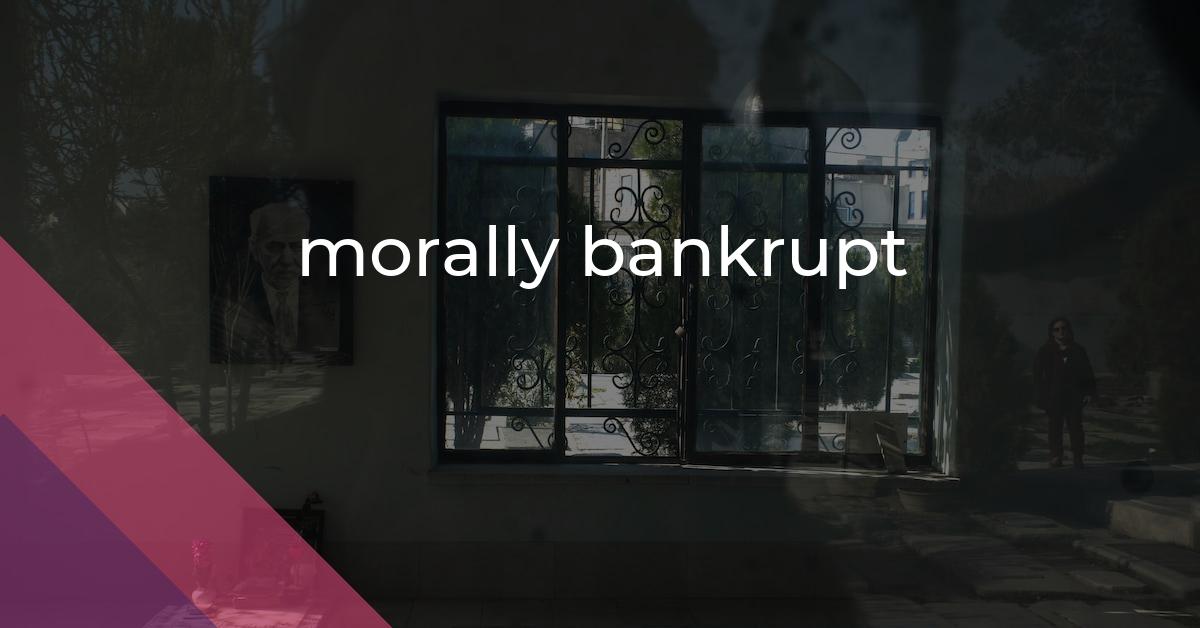morally bankrupt: Idiom Meaning and Origin
What does ‘morally bankrupt’ mean?
The idiom "morally bankrupt" refers to a person or organization lacking any ethical principles or values. It suggests a complete absence of moral integrity or honesty.

Idiom Explorer
An idiom that means someone is very poor and has no money.
The idiom "out of house and home" means to be completely destitute, having lost everything one possesses, especially due to financial hardships or being forced to leave one's home.
The idiom "on the wrong side of history" means being on the losing or morally incorrect side of societal progress. It implies that one's actions or beliefs will be judged negatively in the future.
The idiom "on the skids" refers to a situation or person that is in decline or deteriorating. It can describe something or someone facing a loss of reputation, success, or stability.
The idiom "on the breadline" means to be in a state of poverty or financial hardship.
The idiom "null and void" means that something is completely invalid or without legal standing.
The idiom "not worth a whistle" means something is completely worthless or of no value at all.
The idiom "not worth a dime" means something or someone does not have any value or is not valuable. It suggests that the thing or person is not worth even a small amount of money.
"Not worth a brass farthing" is an idiom that means something is completely worthless or of no value at all.
Unmasking the Origins
The idioms "morally bankrupt," "moral bankruptcy," "moral low ground," and "two pennies to rub together" are commonly used expressions in the English language. They are metaphorical phrases that describe individuals, entities, or actions that are lacking in moral principles, ethics, or integrity. These idioms convey the idea that someone or something is in a state of moral deficiency or insolvency, and they serve as cautionary reminders about the importance of ethical values in society.
The idiom "morally bankrupt" is a commonly used expression in the English language. It is a metaphorical phrase that describes a person, entity, or action that is devoid of moral principles, ethics, or integrity. This idiom is derived from the concept of bankruptcy, which refers to the inability to meet financial obligations. However, "morally bankrupt" extends beyond financial matters, encompassing a broader scope of moral bankruptcy.
The etymology of "morally bankrupt" can be traced back to the early 19th century. The word "morally" originates from the Latin word "moralis," meaning "pertaining to manners or customs." The term "bankrupt" has its roots in the Old French word "banqueroute," which signifies the failure to pay debt.
When analyzing the meaning of "morally bankrupt," it is crucial to understand the underlying connotations and implications. This phrase indicates a severe deficiency in ethical values and a complete disregard for moral standards. It implies a state of moral insolvency, where one's actions or character are void of any redeeming moral qualities.
Using the idiom "morally bankrupt" allows individuals to convey a concise and powerful message about a person or situation lacking moral principles. It is often used in various contexts, such as politics, business, and personal relationships, to criticize individuals or entities for their actions, choices, or behavior.
One possible interpretation of "morally bankrupt" is considering it as a warning sign of a person or entity's questionable trustworthiness. This idiom suggests that the subject is incapable of upholding ethical standards, potentially leading to negative consequences or harmful outcomes. It serves as a cautionary metaphor, urging vigilance when dealing with individuals or entities deemed morally bankrupt.
Furthermore, the idiom "morally bankrupt" highlights the erosion of moral values and ethical considerations within society. By characterizing someone or something as morally bankrupt, it calls attention to the potential ramifications of a society that lacks a strong moral compass and ethical framework. This idiom serves as a reminder of the importance of upholding and nurturing moral principles in our personal and collective lives.
The idiom "moral bankruptcy" is closely related to "morally bankrupt." It emphasizes the concept of a person or entity being bankrupt not only in financial terms but also in moral terms. Someone who is morally bankrupt has no moral values or integrity, which can lead to trust issues and negative consequences in various aspects of life.
Similarly, the idiom "moral low ground" conveys a similar concept to "morally bankrupt." It suggests that someone or something has sunk to a low moral level or is lacking in ethical principles. Just like being morally bankrupt, being on the moral low ground can negatively impact relationships, decision-making, and overall integrity.
Lastly, the idiom "two pennies to rub together" is somewhat related to the concept of moral bankruptcy. It refers to someone who has very little or no money. In the context of morality, it can be interpreted as someone who lacks not only financial resources but also moral values or ethical principles. This idiom suggests a state of extreme deficiency and reinforces the idea that individuals without moral integrity may struggle not only financially but also in other areas of life.
The idioms "morally bankrupt," "moral bankruptcy," "moral low ground," and "two pennies to rub together" all share a common theme of moral deficiency or insolvency. They serve as powerful reminders of the importance of upholding ethical values and moral principles in personal and collective lives. By using these idioms, individuals can effectively convey their concerns or disapproval of those lacking moral integrity and call for reflection on our own commitment to ethical behavior.
Example usage
Examples of how the idiom "morally bankrupt" can be used in a sentence:
- After years of embezzlement and fraud, the businessman was considered morally bankrupt.
- The corrupt politician's actions clearly demonstrated his morally bankrupt nature.
- The scandalous behavior of the celebrity led to public outcry and accusations of being morally bankrupt.
More "Ethics" idioms



